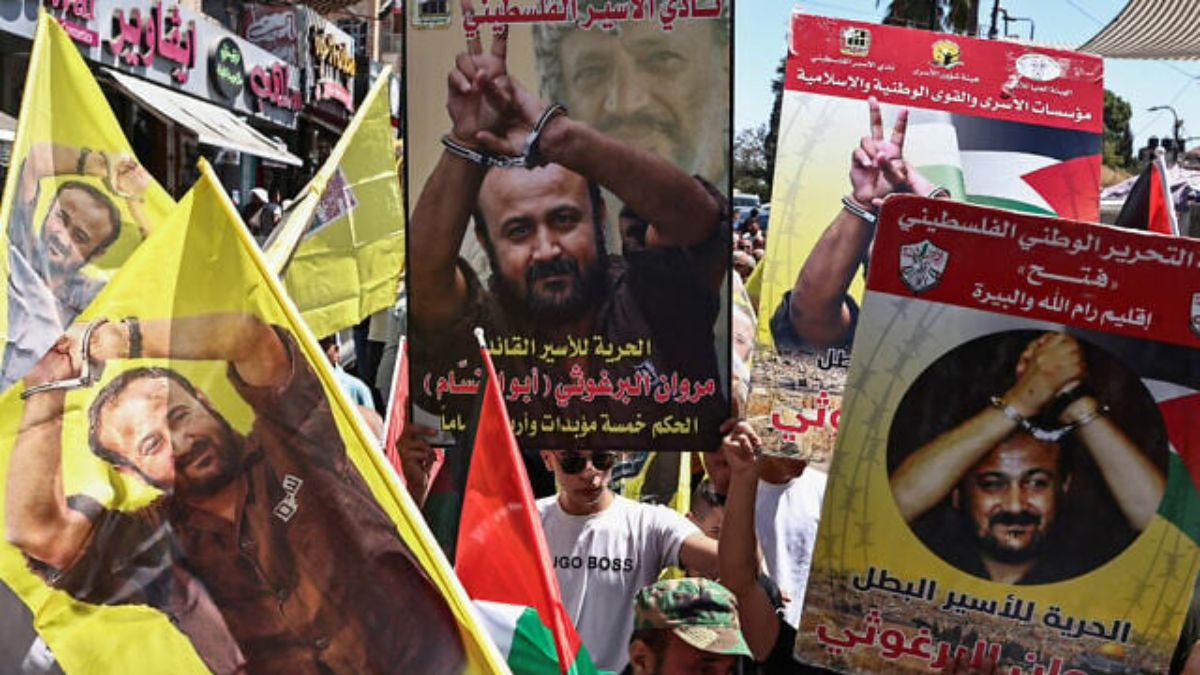The Palestinian prisoners that Israel refuses to release in the Gaza ceasefire exchange

While the Israeli government agreed to the ceasefire deal in Gaza, which included a prisoner-hostage exchange, it omitted the names of four prominent Palestinian prisoners from the list. Marwan Barghouti, Ahmad Sa’adat, Ibrahim Hamed, and Abbas al-Sayed had been removed from the final list. According to reports, they were expected to top Hamas’s demand list for release.
Israeli government spokesperson Shosh Bedrosian, when asked about Marwan Barghouti, said “I can tell you at this point in time that he will not be part of this release,” to the The Times of Israel.
The full list of prisoners' names compiled by the Justice Ministry has not been made public yet. According to the government statement, 250 out of the 270 prisoners and detainees held by the Israel Prison Service would be released.
The ceasefire, which will begin 24 hours after the cabinet's approval, will see the exchange of about 20 live Israeli hostages for the 2000 Palestinian prisoners.
Who are Marwan Barghouti, Ahmad Sa’adat, Ibrahim Hamed, and Abbas al-Sayed?
The four prisoners, Marwan Barghouti, Ahmad Sa’adat, Ibrahim Hamed, and Abbas al-Sayed, were expected to make it to the top of Hamas’s demand list, a report by the Jerusalem Post said.
Marwan Barghouti
Marwan Barghouti is a Palestinian political leader from the West Bank who advocated for a two-state solution before he was imprisoned by Israel.
He used to lead several street protests and diplomatic initiatives until 2002, when he was captured and convicted by Israel. He was charged with involvement in deadly attacks that resulted in the deaths of five people. He was sentenced to five cumulative life sentences for the murders and an additional 40 years for attempted murders and terrorist activity in 2004.
The Inter-Parliamentary Union found that it was “impossible to conclude that Barghouti was given a fair trial due to the numerous breaches of international law."
He often tops Palestinian polls that ask people who they would vote for in a presidential election.
In 1996, he served in the Palestinian Legislative Council for the district of Ramallah. He had participated in diplomatic talks with Israeli politicians.
After Palestinians grew frustrated with the failure of the Oslo records in the 1990s that promised an independent state, frequent protests were arranged, and Barghouti was said to have participated in almost all of them. Israel had attempted to assassinate Barghouti in 2001, according to a report by Haaretz.
After the Second Intifada began, Barghouti is said to have asked Palestinians to target Israeli soldiers and settlers in the West Bank and Gaza but not within Israel. Hamas leaders, on the other hand, supported attacks on Israeli’s within Israel.
Barghouti had continued his political activity from within prison for the 2 decades. Several reports say that he was subject to torture multiple times.
Ahmad Sa’adat
Ahmad Sa’adat, who is also known as Abu Ghassan, is a Palestinian militant and the Secretary General of the Popular Front for the Liberation of Palestine, a Marxist-Leninist Palestinian nationalist organisation. He succeeded Abu Ali Mustafa after he was assassinated by Israel during the Second Intifada.
Sa’adat often claimed that the only a one-state solution and not a two state solution was the only way to solve the Israel Palestinian conflict.
He was arrested and held in prison since 2002 for the assassination of the Israeli Tourism Minister Rehavam Ze'evi, who was killed on 17 October 2001. He was tried and convicted in the Palestinian court.
The Palestinian Supreme Court had declared that Sa’adat’s imprisonment was unconstitutional. Amnesty International also supported this claim and said that he received an unfair trial.
In 2006, Israeli military forces surrounded the prison where Sa’adat was held in a raid and captured him and five others, taking them into custody. Sa’adat was sentenced to 30 years in prison for heading a terrorist organisation.
Ibrahim Hamed
Ibrahim Hamed is a Hamas military commander from the West Bank who was arrested by Israeli authorities in 2006 for ordering suicide bombing attacks during the second Intifada. He was sentenced to serve 45 life sentences after he was accused of being responsible for the deaths of 96 civilians and killing 46 people. He was tried in an Israeli military court.
Israeli sources say that he orchestrated multiple suicide bombings in Jerusalem. He was also accused of being involved in the Hebrew University massacre, which killed nine students.
Abbas al-Sayed
Abbas al-Sayed or Abbas Al-Sayyid is a Palestinian military leader and politician. According to Israeli news reports, he is a senior Hamas operative from Tulkram and was one of the two chief planners of the the Passover Massacre in Netanya, a suicide bombing that took place in 2002.
He is also said to have helped plan the Seder night suicide bombing, which killed 30 people and wounded 160. He was tried in the Tel Aviv district court and sentenced to 35 sentences according to The Jerusalem Post.
According to The Meir Amit Intelligence and Terrorism Information Centre, Sayed kept close contact with senior politicians and operational cadres within Hamas. He was also involved in a variety of political organisational activities and propaganda for the group.
Middle East